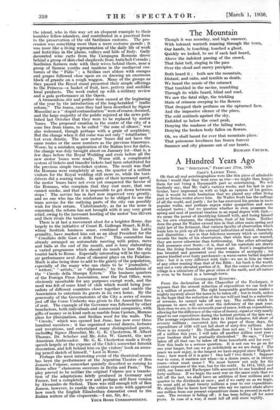A Hundred Years Ago
THE SPECTATOR," FEBRUARY 27TH, 1830.
GALT'S LAWRIE TODD.
Oh that all real autobiographies were like this piece of admirable fiction ! would that they were even as true we might then forgive them for not being a thousandth part so entertaining. We will fearlessly say, that Mr. Galt's various works, and his last in par- ticular, have impressed us with so high- an opinion of his genius, that it would be with hesitation that we placed any other living poet or fiction-writer above him. Sir Walter Scott has the suffrage of all the world, and justly ; for he has exercised his genius in more popular walks, and perhaps enjoys wider sympathies and more enlarged tastes ; but we question whether he even possesses the spring and soul of poetical creation in an equal degree with Galt,— we mean the power of identifying himself with, and losing himself in, his own creatures, the characters, fruit of his brain. Neither does the great Sir Walter exceed him in that other main-spring and right law of the fictionist, that curious faculty of observation which leads him to pick up all the external indications of mind, character, and disposition ; nor in that felicitous memory which so carefully records the traits of his observation, that when they are wanted, they are never otherwise than forthcoming. One other advantage Galt possesses over Scott,—it is, that all his materials are drawn from the living fountain of the present age. Scott's imagination has brooded and generated over the remains of antiquity ; his genius kindled over fusty parchment—a worm-eaten ballad inspired him : but it is very different with Galt—we see in him no traces of any other reading than that of the Bible ; his book is the world, and not a very elevated portion of it. But the corner of an obscure village is a miniature of the great cities of the earth, and all nature is even to be found in a borough-town.
G ovEnziazzvr ECONOMY.
From the declaration of the Chancellor of the Exchequer, it appears that the utmost reduction of expenditure we can look for is a million of pounds. The right honourable gentleman makes a mighty mystery about the taxes to be taken off ; but in truth, unless in the hope that the reduction of the tax will not lead to a reduction of revenue, he cannot take off any tax. The million which he proposes to save- will not -cover the deficiency of the past year. Here then we are, in the sixteenth year of peace, with an expenditure, allowing for the difference of the value of money, equal or very nearly equal to our expenditure during the hottest portion of the late war. The average expenditure from 1804 to 1813 inclusive, fell short .of seventy millions ; converted into the paper of those days, the expenditure of 1830 will not fall short of sixty-five millions. And there is no remedy ! Mr. Goulburn does not say, " I have taken off a million this year, I will take off another million next year ; your burdens shall be gradually diminished." He says, " I have taken off all that can be taken off from henceforth and for ever." Now this leads to a serious question. It is not can we go on for one year longer, but can we go indefinitely as we are doing ? The peace we now enjoy, is the longest we have enjoyed since Walpole's time ; how much of it is gone ? One half ? two thirds ? Suppose war to come, it matters not when—in a dozen years, or in twenty years—what must ensue ? We must borrow not only for the current expenses of the war, but for the outfit. In 1814, 1815, and 1816, our loans and Exchequer bills amounted to one hundred and forty millions. If we begin the next war on the same scale that we left off the last, we shall have an addition of four millions and a quarter to the dividends at once • and if we carry on as we begin, we must add at least twenty millions a year to our expenditure. We should like to know how those who say we cannot abate above one million from our present expenditure mean to proceed in such a case. The revenue is falling off ; it has been falling off for some years. In case of a war, it must fall off still more rapidly.
























































 Previous page
Previous page